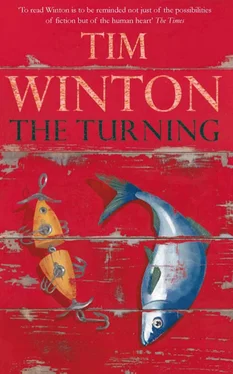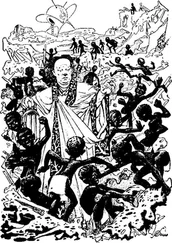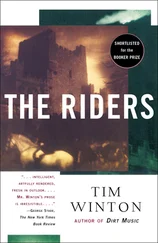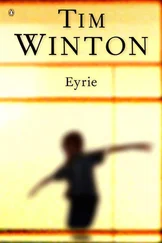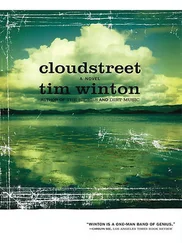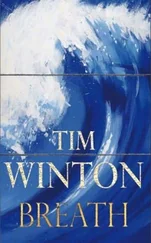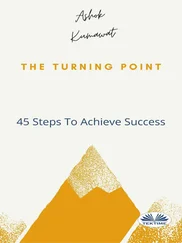Just the sight of those bottle stacks outside the old blokes’ huts used to make me thirsty. But it fades.
You read a lot, I see.
Yes. It’s an education. But my eyes are going.
We’ll get you some glasses, I said. What time d’you want to leave? Oh, first thing. Fair enough.
He gave me his bed that night and unrolled a battered swag on the floor in front of the stove where he slept with the dog, each of them snoring quietly through cycles of synchronization, while I lay awake rattled by the smell of his body in the blankets about me and the strangeness of the hut with its animal sounds and sudden silences. I wondered how my mother would receive him, how she would react to the knowledge that he’d salvaged himself, and that she’d found him too late. And when she was gone, what then, what would I do about him? I lay there for hours on the narrow iron bunk like a frightened boy and late in the night I covered my face with the pillow which smelled of him and cried at the thought of my mother.
When I woke, the old man was sitting by the stove, shaved and dressed in the lamplight. It was early morning. His swag was rolled and on his knee was a battered cashbox which he held like a man entrusted.
LANG PULLED OVE R BY THE CREEK. He parked in a wedge of sunlight between trees and switched off the ignition. He listened to the soughing wind and the static surf of the two-way. The van stank of sweat and puke and Pine-O-Cleen. He hoisted his belt where the handcuffs snagged against the upholstery of the seat. Burrowing in his tunic for an antacid, he looked out across the sodden September paddocks. His mouth was chalky. His guts felt like hell.
On the seat beside him lay the last court summons of the day. Delivering them was work for a junior. It was another slight, a message to pull his head in, and maybe even a way to get him out of town for a while. At least it was time alone, a bit of respite. If he spaced it right he’d be back for the change of shift and home for tea. Ten minutes to himself, no harm in that. Trouble was, there’d been a lot of ten-minute breaks lately and some of those had run to an hour or more. It wasn’t like him. He didn’t used to be this way.
Lang had only been in town a year. Ten months, to be exact. It was a plum posting, something to be excited about. A quiet country town on the coast. Pretty harbour, decent school, miles of white beaches. Compared to the strife-torn desert communities he could have faced, it was a gift. But within weeks of his arrival he began to feel uneasy. It wasn’t the town. It was the blokes in the job. Conversations dried up as he came into the crib room. Glances were exchanged. He sensed that there were arrangements and alliances he wasn’t privy to. He wondered if it was his reputation as a bit of a straight arrow. Within months he’d gone from being uneasy to feeling unsafe.
He eased the little flat bottle from between the seat springs, uncapped it in his lap and took a quick belt. It was cheap stuff. He didn’t even like brandy. This was, he told himself, just a temporary thing.
A cow bellowed out of sight. Wattlebirds clacked in the trees around him. It was peaceful here and suddenly warm and for a moment he could believe that all this aggravation would pass, that the sleeplessness, the gut-burning anxiety, the creeping sense of paralysis would work themselves out. Maybe he’d put a few more bits of the puzzle together, find an ally. He just needed one honest copper to watch his back. But the flash of brandy-heat faded and he thought of Carol and the kids. They’d been through enough already. The bastards had got to them, made their point about laying off and staying clear. And that’s what he’d do; there was no alternative. He’d keep his head down, bide his time, and in a year or so apply for a transfer.
The radio spluttered. There was a report of climbers lost out in the ranges. He listened to the two-way traffic as the beginnings of a search took shape. On another frequency the SES volunteers were chatting excitedly. One climber lost, another had raised the alarm. Lang dialled back to his own channel and wedged the bottle under the seat. He knew he wouldn’t be home for dinner. He had the van turned around and was out on the highway before his call-sign came over the air.
It took half an hour to get out amongst the ranges and when he turned into the dirt carpark at the foot of the sheer bluff called The Dial, the sun was gone behind low, threatening cloud, and the vollies were already assembled, still studding their orange overalls in front of the trucks. Lang pulled on his plastic poncho. He stuffed the antacids and the brandy bottle into his tunic and made his way over to join the briefing. Macklin was talking. He and Lang were of the same rank, but Macklin had been here two years and he knew the geography. To that extent, at least, you could trust him.
Lang looked at the map taped to the side of the truck and pulled the hood up over his cap as a misting rain began to fall.
How’s it looking? he asked Macklin as the vollies broke up into task groups.
Pretty straightforward, said Macklin, dragging on his own coat. Couple of hikers. The woman’s over in the truck with the quack. She’s totally hysterical. Far as we can tell, the bloke’s fallen off the first tier. It’s all thickets at the base there. He’s set us a bit of a task.
Any chance of a chopper?
Nup.
I’ll go with the western group.
That’s the plan, Bob. Let’s hope it’s done by dark. I’m cold already.
Lang took a walkie-talkie from the truck and wished he had a decent pair of boots. He joined a chirpy bunch of volunteers as they set out down the long belly of the walk trail. The valley was thick with wandoo and marri and beneath the trees the scrub sprouted tiny darting birds and a blur of insects. The bush smelt tart, peppery. Everything looked blue in the late afternoon light.
After fifteen minutes the trail swept up towards the broad base of the bluff. There were no trees, just tight mallee heath and low boulders. The trail was good but the going was much tougher on the steep incline, and as the keen and the fit scrambled ahead of him and the wheezers lagged behind, Lang found space enough to consider the deep and tangled thickets beneath the peak. A bloke would take some finding up there; it was a nasty bit of country and there was plenty of it. He wondered how far you’d fall, whether you’d be swallowed, even cushioned, by all that teatree and banksia or if the tight-packed canopy might resist the impact and send you bouncing down the slope to burst like a bag of trash against the first big rock in your path.
He chewed an antacid. Every upward step tightened his hamstrings. Sweat soaked through his shirt and into his tunic and rain dripped from the peak of his cap and ran down his nose.
At a boulder the size of a beached whale, Lang rested a moment and looked back down to the carpark where two more police vehicles were pulling in. Young fellas, he thought, dragged in early for the evening shift. Beyond the little beige clearing of the carpark, the land stretched away blue in the distance. The surrounding peaks were headless in the mist. It was beautiful up here, and if it hadn’t been for the hiss and squawk of the walkie-talkie, it would have been peaceful too. At the foot of the bluff Lang bunched the searchers up the best he could on the steep, narrow trail. Above them The Dial rose in a series of granite extrusions whose peaks were obscured now by rainy mist. As Lang stood there waiting for stragglers and to-ing and fro-ing with Macklin on the air, the sky seemed to lower itself even further and the light grew dimmer. He broke the searchers up into pairs and told them to work ten yards apart across the ground immediately below the bluff and to meet back here in one hour. But with them all strung up and down the track in single file it was a case of Chinese whispers and he wasn’t sure how clear he’d made himself. He was anxious about the poor light, the lack of time, the ambulance that still hadn’t arrived.
Читать дальше
